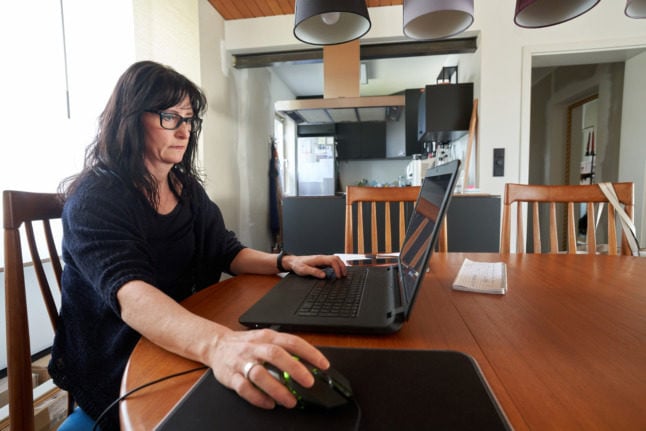Working in Germany: A weekly roundup of the latest jobs news and talking points

Every week The Local brings you a roundup of the latest jobs news and topics around working in Germany. Here we look at the impact of Covid on industry, the survival of the humble office, and the extension of the Kurzarbeit scheme.
Office not dying out - despite pandemic 'home office'
Regardless of the trend towards working from home in the pandemic, the office will not disappear from everyday working life for the time being, new research shows.
Although companies in Germany are still holding back when it comes to renting new office space, there has not yet been a move away from the office on a grand scale. Economists, brokers and real estate experts expect Covid to revolutionise the world of work with more people to work from home, but they believe it is premature to sound the death knell for the office.
In July, only a quarter of people were still working at home at least some of the time, according to estimates from the Munich-based Ifo Institute. Economists attribute this not only to the end of the government's 'home office obligation' for companies, which business associations opposed, but also to people wanting to socialise with their colleagues.
About a year and a half ago, millions of workers switched to the home office virtually overnight because of the pandemic; in the meantime, lots of employees are already back at their workplace.
READ ALSO:
- End of home office: Are employees in Germany ready to return to the workplace?
- OPINION: Why not all Germans will embrace working from home post-pandemic
"People are again looking more often for personal contact in the office," said Ifo researcherJean-Victor Alipour.
Fourth lockdown would cost 'extra €10 billion'
The Institute of the German Economy (IW) has warned against a fourth Covid lockdown in view of the threat of billions in damage to the economy.
Although large parts of the German economy are currently recovering after the lifting of many Covid restrictions, the loss of value added in the second half of 2021 would amount to €30 billion euros, the IW said this week, reported Spiegel.
A new lockdown would increase this loss by another €10 billion in the fourth quarter, the IW said.
READ ALSO: German unemployment rate drops after Covid restrictions relaxed
All in all, the IW put the damage caused by the pandemic, including the second quarter of 2021, at a massive €300 billion. A fourth lockdown would further exacerbate this balance, the pro-employer institute warned.
In view of the spreading Delta variant, the IW called for more speed in the vaccination campaign. "Both from a health and an economic point of view, the vaccination drive remains the only way out in the long term," said IW Director Michael Hüther.
Extension of the Kurzarbeit scheme - and more financial aid for businesses
At the meeting between Angela Merkel and the 16 state leaders on Tuesday, ministers agreed to continue offering financial support for businesses until the end of 2021. In addition, legislation to make it easier for employers to access funding for Kurzarbeit (shorter working hours for employees) will also be continued, according to DPA.
Munich's Ifo Institute estimates that around a million workers in Germany are currently relying on the scheme as they continue to work reduced hours.
Nach Schätzung des Münchener Ifo-Instituts sind noch eine Million Menschen in #Kurzarbeit: https://t.co/xHCUqf2BNZ
— Frankfurter Allgemeine (@faznet) August 5, 2021
In recent weeks, Economics Minister Peter Altmaier (CDU) and Finance Minister Olaf Scholz (SPD) had already raised the idea of continuing the bridging assistance for companies, while Labour Minister Hubertus Heil (SPD) had spoken out in favour of extending the Kurzarbeit allowance for employees working fewer hours.
Both are central government instruments worth billions to cushion the impact of the pandemic on jobs and companies.
READ ALSO: Kurzarbeit: German minister plans to extend reduced working hours scheme
A few weeks ago, the federal government decided that the 'Bridging Aid III' subsidies, which were previously limited until the end of June, would be continued as 'Bridging Aid III Plus' until September.
Now ministers will also include what they are terming a 'Restart Bonus', which will allow companies to receive higher subsidies for personnel costs if they take on new staff or bring furloughed staff back into the firm.
No decision on mandatory home office
In the days leading up to Tuesday's roundtable, several German media outlets speculated that the country would soon see a return to mandatory home office.
Proposals put forward by the Ministry for Labour and Social Affairs (BMAS) ahead of the talks envisioned a requirement for employees to work from home if the 7-day incidence of Covid infections per 100,000 people rose above 50 in a certain area.

If infection rates continue to rise, BMAS is likely to push for mandatory home office once again. Photo: picture alliance/dpa | Thomas Frey
But amid key decisions on paid-for Covid tests and Germany's health pass system, working regulations appear to have fallen by the wayside.
READ ALSO: EXPLAINED: How Germany aims to increase vaccinations and control the Covid fourth wave
"No decision was made [on mandatory home office]," a spokesperson for BMAS told The Local.
"In principle, flexible working made an important contribution to protecting the health of employees during the pandemic. Working from home is a crucial measure for minimising the risk of infection while still doing necessary work from home."
This doesn't, however, mean that the proposals are off the table. Should higher infection rates occur in autumn, mandatory home office could once again be revisited as a means of stemming the spread of the virus.
"BMAS is continuing to monitor infections very closely," the spokesperson said.
"In the event of a sharp increase in the nationwide incidence of Covid-19, BMAS advocates reinstating tried and tested measures so that home office once again becomes a mandatory requirement. More remains to be seen."
Comments
See Also
Office not dying out - despite pandemic 'home office'
Regardless of the trend towards working from home in the pandemic, the office will not disappear from everyday working life for the time being, new research shows.
Although companies in Germany are still holding back when it comes to renting new office space, there has not yet been a move away from the office on a grand scale. Economists, brokers and real estate experts expect Covid to revolutionise the world of work with more people to work from home, but they believe it is premature to sound the death knell for the office.
In July, only a quarter of people were still working at home at least some of the time, according to estimates from the Munich-based Ifo Institute. Economists attribute this not only to the end of the government's 'home office obligation' for companies, which business associations opposed, but also to people wanting to socialise with their colleagues.
About a year and a half ago, millions of workers switched to the home office virtually overnight because of the pandemic; in the meantime, lots of employees are already back at their workplace.
READ ALSO:
- End of home office: Are employees in Germany ready to return to the workplace?
- OPINION: Why not all Germans will embrace working from home post-pandemic
"People are again looking more often for personal contact in the office," said Ifo researcherJean-Victor Alipour.
Fourth lockdown would cost 'extra €10 billion'
The Institute of the German Economy (IW) has warned against a fourth Covid lockdown in view of the threat of billions in damage to the economy.
Although large parts of the German economy are currently recovering after the lifting of many Covid restrictions, the loss of value added in the second half of 2021 would amount to €30 billion euros, the IW said this week, reported Spiegel.
A new lockdown would increase this loss by another €10 billion in the fourth quarter, the IW said.
READ ALSO: German unemployment rate drops after Covid restrictions relaxed
All in all, the IW put the damage caused by the pandemic, including the second quarter of 2021, at a massive €300 billion. A fourth lockdown would further exacerbate this balance, the pro-employer institute warned.
In view of the spreading Delta variant, the IW called for more speed in the vaccination campaign. "Both from a health and an economic point of view, the vaccination drive remains the only way out in the long term," said IW Director Michael Hüther.
Extension of the Kurzarbeit scheme - and more financial aid for businesses
At the meeting between Angela Merkel and the 16 state leaders on Tuesday, ministers agreed to continue offering financial support for businesses until the end of 2021. In addition, legislation to make it easier for employers to access funding for Kurzarbeit (shorter working hours for employees) will also be continued, according to DPA.
Munich's Ifo Institute estimates that around a million workers in Germany are currently relying on the scheme as they continue to work reduced hours.
Nach Schätzung des Münchener Ifo-Instituts sind noch eine Million Menschen in #Kurzarbeit: https://t.co/xHCUqf2BNZ
— Frankfurter Allgemeine (@faznet) August 5, 2021
In recent weeks, Economics Minister Peter Altmaier (CDU) and Finance Minister Olaf Scholz (SPD) had already raised the idea of continuing the bridging assistance for companies, while Labour Minister Hubertus Heil (SPD) had spoken out in favour of extending the Kurzarbeit allowance for employees working fewer hours.
Both are central government instruments worth billions to cushion the impact of the pandemic on jobs and companies.
READ ALSO: Kurzarbeit: German minister plans to extend reduced working hours scheme
A few weeks ago, the federal government decided that the 'Bridging Aid III' subsidies, which were previously limited until the end of June, would be continued as 'Bridging Aid III Plus' until September.
Now ministers will also include what they are terming a 'Restart Bonus', which will allow companies to receive higher subsidies for personnel costs if they take on new staff or bring furloughed staff back into the firm.
No decision on mandatory home office
In the days leading up to Tuesday's roundtable, several German media outlets speculated that the country would soon see a return to mandatory home office.
Proposals put forward by the Ministry for Labour and Social Affairs (BMAS) ahead of the talks envisioned a requirement for employees to work from home if the 7-day incidence of Covid infections per 100,000 people rose above 50 in a certain area.

If infection rates continue to rise, BMAS is likely to push for mandatory home office once again. Photo: picture alliance/dpa | Thomas Frey
But amid key decisions on paid-for Covid tests and Germany's health pass system, working regulations appear to have fallen by the wayside.
READ ALSO: EXPLAINED: How Germany aims to increase vaccinations and control the Covid fourth wave
"No decision was made [on mandatory home office]," a spokesperson for BMAS told The Local.
"In principle, flexible working made an important contribution to protecting the health of employees during the pandemic. Working from home is a crucial measure for minimising the risk of infection while still doing necessary work from home."
This doesn't, however, mean that the proposals are off the table. Should higher infection rates occur in autumn, mandatory home office could once again be revisited as a means of stemming the spread of the virus.
"BMAS is continuing to monitor infections very closely," the spokesperson said.
"In the event of a sharp increase in the nationwide incidence of Covid-19, BMAS advocates reinstating tried and tested measures so that home office once again becomes a mandatory requirement. More remains to be seen."
Join the conversation in our comments section below. Share your own views and experience and if you have a question or suggestion for our journalists then email us at [email protected].
Please keep comments civil, constructive and on topic – and make sure to read our terms of use before getting involved.
Please log in here to leave a comment.